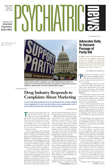It is a mistake for psychiatrists and mental health professionals who work in or consult to nursing homes to assume that the nursing home resident is going to be their sole focus. Many of these clinicians and other nursing home staff find they spend as much—or even more—time responding to the emotional needs and psychological stresses of the resident’s family members.
For Nancy O’Dowd, a clinical nurse specialist in geriatric psychiatry who consults to several New Jersey nursing homes, more than 10 percent of the consultation visits turn up no new problem with the resident, but serious problems being caused by his or her family “driving the staff crazy.”
Speaking at an APA annual meeting session in Philadelphia in May, O’Dowd identified several factors that lead to the frequent stress-related outbursts that family members direct at nursing home staff.
Paramount among these are the “trap of cognitive impairment”—frustration at not being able to find a way to respond to or communicate with a loved one shifting between lucidity and dementia—and trying to cope with the “ambiguous loss” they feel when their impaired relative no longer recognizes them or mistakes one of them for another person.
She also urged psychiatrists confronting emotionally distraught relatives to be aware that aggressive or unreasonable behavior might be symptoms of the “constant and evolving grief cycles” relatives go through as the resident stays in the home much longer than the relatives had anticipated. Such behavior may also be arising from guilt over decades of family conflict and the relatives’ inability to discuss or resolve the issues now with their cognitively impaired relative.
The emotional expressions that signal relatives grappling with grief reactions are often far from insignificant, O’Dowd pointed out. These include statements accusing the staff of unprofessional behavior or poor decision making, yelling and cursing at the staff, and even verbal or physical threats. Inappropriate behaviors by residents’ relatives are also common, and nursing home staff needs to be alert to them, she advised. In one case she cited, a family who thought they were being helpful handed out sweets to all the residents in the relative’s area, including those who were diabetic and on restricted diets.
Help Families Adjust
When nursing homes’ mental health staff and psychiatric consultants can educate families and attend to their emotional needs—that is, “teach them how to visit”—many of the problems can be avoided or reduced, O’Dowd emphasized. Constructive strategies include acknowledging all that the families have done for the person, “communicating honestly” with them about the factors related to their relative’s care, and allowing them the opportunity to feel useful to the resident and others, she noted.
She said it is important that staff convey the message that despite the guilt families may feel, it is “permissible to withdraw” to some extent from their relative’s care, that is, to take some time off. “A resident will adjust to the nursing home better” if relatives don’t come every day, she observed.
Nursing home staff can and should be trained to focus on families’ emotional needs and how to respond to them, she stressed. Among the advice she gave was “Don’t get defensive!” Doing so in the face of relatives’ criticism or accusations will just leave the staff looking guilty, she said. If relatives are abusive or out of control, staff should just walk away until they cool down, she advised.
It is critical that staff at all levels are aware that they “have the right not to be abused by either residents or their family members,” O’Dowd said.
She also cautioned against nursing home staff expecting to be the recipients of obvious expressions of a family’s gratitude.
Staff Education Important
Psychiatrist Istvan Boksay, M.D., oversees a program to educate nursing home staff about mental health concerns. Boksay, the director of the Center for Aging and Dementia at New York University Medical Center, said that education is such an important element of staff training that his program conducts such sessions two to three times a year.
“It can’t work if it’s a one-shot deal,” Boksay stressed. Developments in geriatric mental health are occurring regularly, and turnover of nursing home staff is considerable, he said.
One development of which it is especially important for psychiatrists to be aware, Boksay said, is that nursing home patients with a faster course of dementia have on average 50 percent more medical problems than patients with a slower course—six serious problems versus four. It is thus crucial that psychiatrists and nursing home staff carefully monitor—and get treatment for—these faster-deteriorating patients, who are at more risk for experiencing medical complications.
Since 1987 psychiatrists and mental health professionals who treat or consult on nursing home residents, along with the administrators who operate the facilities, have had to make sure that whatever services are provided to residents with mental disorders conform with strict federal regulations enacted as part of the Omnibus Budget Reconciliation Act (OBRA).
OBRA’s goal was to protect nursing home patients from abuse and neglect and to ensure that they receive quality medical care, explained workshop chair Marc Rothman, M.D. It mandates that residents receive comprehensive mental health assessments, for example, and are free from “unnecessary” medications. This was a response to a volume of complaints to Congress about nursing home patients being overmedicated, often into a stupor, and then ignored.
OBRA also requires that residents on antipsychotic drugs receive gradual dosage reductions and are provided with “behavioral interventions” as well. In patients for whom a dosage reduction would not be appropriate, psychiatrists must document their reasoning, Rothman noted. For residents who have not been on an antipsychotic, psychiatrists must show that such a drug is necessary to treat a specific condition.
OBRA appears to have succeeded in its goal of significantly decreasing use of antipsychotics and restraints, said Rothman. ▪

